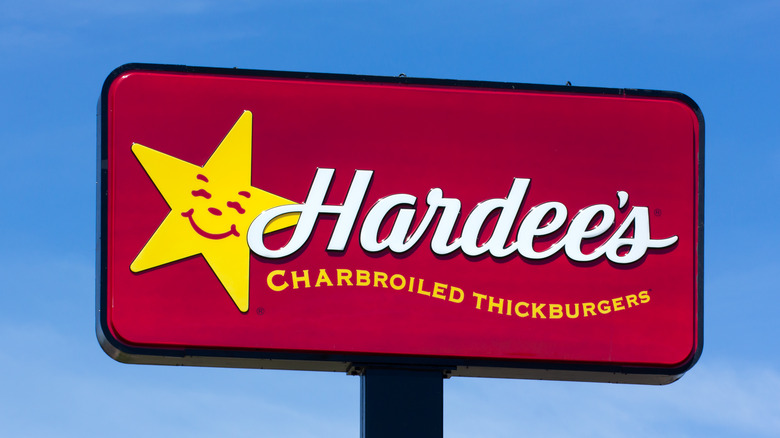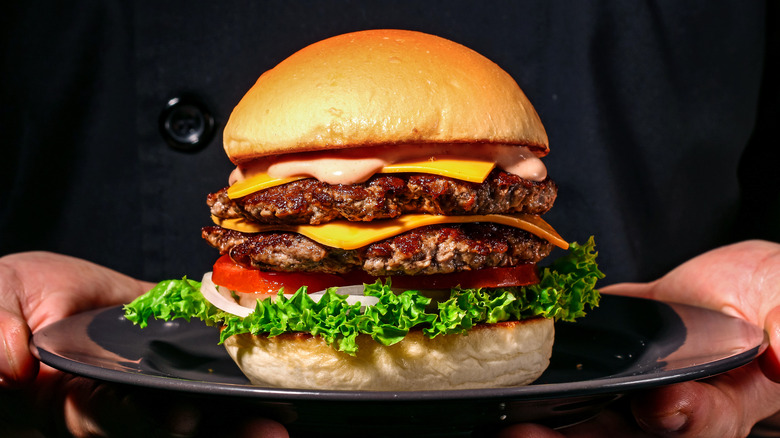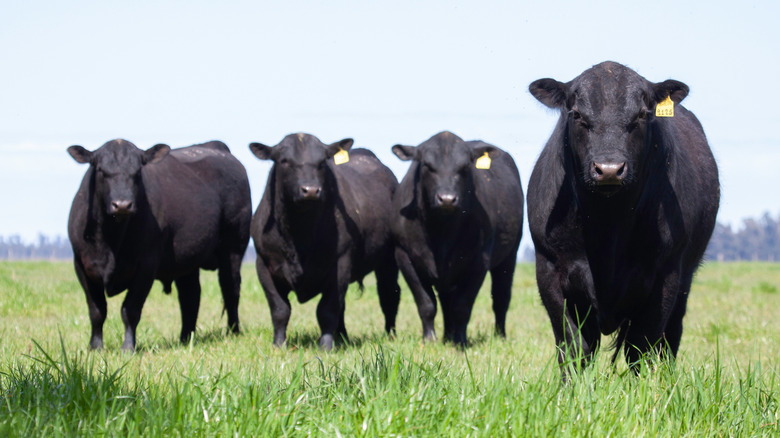The Hardee's-Jack In The Box Feud You Might Not Have Known About
Hardees and Carl's Jr. are probably best known for their burgers, and in 2007, these two sister chains — which are both owned by parent company CKE Restaurants — were selling patties made from Angus beef. However, that year, one of their main rivals decided they wanted to take the gloves off in the burger wars among popular chains. Jack in the Box, another fast food franchise that had recently released a sirloin burger, launched a new ad campaign trolling the Angus burgers offered at Hardees and Carl's Jr.
The ads joked about the similarity between the word "Angus" and the technical word for a cow's behind. The commercial featured Jack, the company's mascot, announcing to Jack in the Box's employees that they "had just launched the first 100 percent sirloin burger in fast food history," using a diagram of a cow to point out where the sirloin cut comes from. A curious employee then raised his hand to ask, "Jack, our competitors serve Angus burgers. Could you point to the Angus area?"
"I'd rather not," the mascot replied devilishly. But Andy Puzder, the then-CEO of CKE Restaurants, wasn't laughing, and his frustration would last a lot longer than the 30 seconds of an ad spot. Instead, according to NBC News, the campaign sparked a feud that ended up in U.S. District Court.
The ad implied Angus burgers came from an unappetizing source
To most casual observers, it was apparent that Jack in the Box was implying their rival's burgers were so named because they came not from Angus cattle but from a cut of meat taken from an especially unsavory body part. (The hand motion the inquisitive employee made and the direction of Jack's awkward glance at the diagram didn't help.) Puzder didn't take too kindly to the insinuations presented by the new commercial. "If they want to have a war, we will take the gloves off," he said in a statement at the time, adding that he thought they were "not being funny," per CNN.
In response to the ad, Puzder filed a lawsuit in federal court in Santa Ana, California, according to Nation's Restaurant News. In the suit, he alleged that the company's rival was being intentionally misleading about the quality of their Angus burgers by creating "the false impression that the meat used in plaintiff's 100% Angus Beef Hamburgers comes from the rear-end and/or anus of beef cattle by creating phonetic and aural confusion between the words 'Angus' and 'anus,'" CNN reported. Puzder wanted not only for the ads to be pulled, but for Jack in the Box to run a different commercial correcting the implication that Angus beef came from a cow's anus. The suit also asked for unknown damages.
The two companies eventually settled out of court
In case the ad got you wondering, Angus beef is meat that comes from a specific breed of cattle. Officially called Aberdeen Angus cattle, this Scottish breed is frequently used in burgers because there is a high degree of marbling in their beef, according to Steak School. This helps produce a high-quality, juicy, mouthwatering burger — not the unsavory cut of meat that the Jack in the Box ad implied.
It seems Puzder was able to provide at least some proof to his claim that the misinformation in the ads was damaging his business. In court, he pointed to a survey of 404 people showing that a not-insubstantial 36 percent of respondents believed Angus beef did indeed come from the cow's buttock region, rather than the breed of cattle, according to Business Insider.
Based on this evidence, CKE Restaurants moved to have the offending ads pulled from the air. While that request was denied, the two competing burger chains were able to come up with a settlement agreeable to both of them outside of court. The case was then dismissed, and everyone moved on with their lives, including Puzder. That is, until 2017, when he was nominated by then-President Donald Trump to become labor secretary, and the story of the lawsuit was briefly brought back to headlines.


